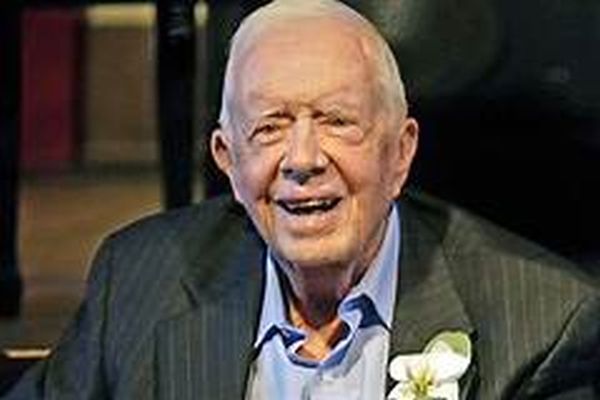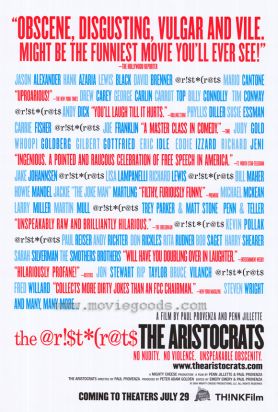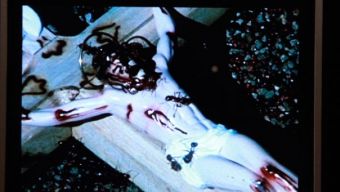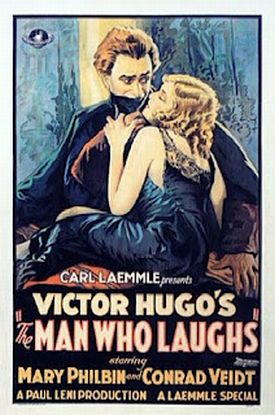Jimmy the good. . .
One of the media’s formula headlines of which I am least fond reads like this: “X isn’t what you think.” Now how does some junior headline writer know what I think about x? It’s just another way for the erstwhile “news” reporters to proclaim, without knowing me, that they are smarter than I am. It’s bad manners, apart from anything else — related to and only a degree or two less offensive than that other long-time bit of media charlatanry: “Everything you know about Y is wrong.” Wanna bet? It may of course be so, but I like the odds that it’s the other guy who’s going to be wrong, since I only have to prove I’m right about something, where he has to show that I’m wrong about everything. But that’s today’s media for you: so arrogantly cocksure of their intimacy with The Truth because they know no one (or no one they need to listen to or care about) will challenge them by demanding that they put up or shut up.
I mention it because, after the announcement that Jimmy Carter had entered hospice care at home in February, an early entry in the coming outpouring of media commemorations of the ex-President’s life and work appeared in The New York Times under the headline: “Jimmy Carter’s Presidency Was Not What You Think.” The author, the Carter biographer Kai Bird, may not have known what I think, but from the headline alone I could have made a pretty good guess about what he thinks. And even if I couldn’t, the article’s appearance in the ever more left-leaning New York Times would have given the game away. What Mr Bird — and, I surmise, The New York Times — thinks about President Carter, aside from the fact that “the man was not what you think,” is as follows: “He was tough. He was extremely intimidating. Jimmy Carter was probably the most intelligent, hard-working and decent man to have occupied the Oval Office in the 20th century.”
Though not precisely what I think, this handsome tribute is not entirely inconsistent with it either. I’m certainly willing to concede Mr Carter’s intelligence, his industry and his decency while reserving the right also to think that he was the worst president, qua president, of my lifetime — or at least he was until the advent of the present incumbent. But years of his life spent close to le grand Jimmy and a media mind-set formed by an obsession with scandal have left Mr Bird apparently unable to recognize that decency and good character actually have little to do with presidential performance. Being a good man and not just a good president, as he also claims Jimmy was, might even be a hindrance to anyone whose first priority was not to demonstrate how intelligent, hard-working and decent he was but to advance the interests of his country and of his fellow countrymen by any means necessary.
You will have spotted the problem for any further discussion of the matter already: to Kai Bird, as to many others of Mr Carter’s admirers, being a good president means being a good man. The Venn diagram of good presidents is a little circle entirely contained within a larger circle of good men. For me on the other hand, as I suspect for many others these days, the two circles barely intersect. And if you believe everything they say about Abraham Lincoln, they may not intersect at all. Being a good man is hard, to be sure, but being a good president is even harder — as hard as it is rare — and being the latter leaves no time or energy for cultivating the virtues normally associated with being the former. “The intellect of man is forced to choose,” wrote wise old W.B. Yeats: “Perfection of the life or of the work.”
I also can’t help noticing that the Bird’s-eye view of the perfected presidential life is just what we used to hear over and over again from the bien pensant during the Trump presidency only in reverse: Donald Trump was a bad man, it was said, therefore, he was also a bad president. Indeed, he was generally thought by the media to have been an even worse president than he was a man, though the evidence of his badness — when it wasn’t merely fabricated, like Russian “collusion” — was almost always cited from his private life or public pronouncements, rarely if ever from his specifically presidential actions unless, like the “Muslim ban” or the border wall, these could be characterized, well apart from any good they might have done, as “racist.”
You might almost say that, without the shining example of Jimmy Carter, polished to a high gloss by hagiographers like Kai Bird, there could have been no anti-Trump jihad by the media and their Democratic party and deep state enablers. Jimmy could continue to stand for what a president ought to be, in their view, since that was in so many ways the opposite of what President Trump was. Candidate Carter, running for the presidency in the wake of Watergate, had himself first introduced the idea of his own righteousness as his principal qualification for office, and then he went on to make that righteousness the cornerstone of a “human rights” based foreign policy. Instead of seeking to help his country’s friends and frustrate her enemies, he preached his Jimmy-brand of righteousness to the whole world.
Though no doubt very virtuous, this was not very politic. I remember observing at the time that our president was like the rich man so pleased with himself that he cannot see how the rest of the world sees him. People will listen eagerly if he tells them how to be as rich as he is, but they will turn away in disgust if he tells them how to be as good as he is. Much of the rest of the world turned away in disgust from Jimmy — even those like the Iranian Ayatollahs whom he foolishly tried to conciliate (remember Andrew Young, the Carter UN representative at the time, calling the Ayatollah Khomeini “a saint”?) — and, by 1980, so did the American people. And yet the idea of moral righteousness as the proper foundation of foreign and domestic policy alike, in the form of virtue-signaling if not of actual virtue, has lived on in the Democratic party, and much of the Republican party as well.
The rest of Mr Bird’s piece, purporting to demonstrate that Jimmy was a good president as well as a good man, seems to me to be more a compendium of conventional wisdom about the former president than a catalogue of new and startling insights to make us revise our opinion of him. Don’t tell me that you haven’t read something like the following before, and probably more times than you can count:
A post-Watergate, post-Vietnam War era of disillusionment with the notion of American exceptionalism was the perfect window of opportunity for a man who ran his campaign largely on the issue of born-again religiosity and personal integrity. ‘I’ll never lie to you,’ he said repeatedly on the campaign trail, to which his longtime lawyer Charlie Kirbo quipped that he was going to ‘lose the liar vote.’ Improbably, Mr. Carter won the White House in 1976.
If it was “the perfect window of opportunity” for such a man to win the presidency, how can it have been “improbably” that he won? In fact, the real improbability would have been losing, which he nearly did, in spite of the well-publicized gaffes of his opponent, Gerald Ford, who also had the pardon of Richard Nixon hung round his neck.
Then there’s this: “He decided to use power righteously, ignore politics and do the right thing. He was, in fact, a fan of the establishment’s favorite Protestant theologian, Reinhold Niebuhr, who wrote, ‘It is the sad duty of politics to establish justice in a sinful world.’” It’s been a long time since I read Moral Man and Immoral Society, but I don’t think that Jimmy’s preaching about human rights to the least formidable of the world’s bad actors (when it came to Soviet Russia he thought we had had for too long “an inordinate fear of communism”) was quite what Niebuhr had in mind by “establish justice.”
The final bit of evidence that the Carter presidency wasn’t what I supposedly think it was turns out to be this: “If the election in 1976 offered hope for a healing of the racial divide, his defeat signaled that the country was reverting to a conservative era of harsh partisanship. It was a tragic narrative familiar to any Southerner.” Reagan carried 44 states in 1980, 49 in 1984, and yet he is supposed to have ushered in a “conservative era of harsh partisanship”? Like so many other Democrats today, Mr Bird only calls it partisanship when the other side is doing it. He is right about one thing, however, which is the long-lasting legacy of the Carterine moralism in foreign policy. This has lately resurfaced in President Biden’s more than munificent advocacy of the cause of Ukraine in its resistance to Russian aggression, proclaimed in strictly moral terms and almost without regard to our own national interests.
Yet there is one big difference between President Carter and his crusading successor: his moralism was sincere and from the heart, God bless it — that heart in which he once confessed to having
committed adultery. Moral righteousness for him was not just something that would play well, politically. Though naive in his idealism towards a wicked world beyond our borders, he really did believe in truth and righteousness, and not just for other people but himself as well. To him, America could and did stand for such truth and righteousness in the eyes of the world.
Among the other Good Works performed by Jimmy in his long retirement, he traveled around the world to monitor the fairness of elections in Third World countries where fair elections have been a bold (and, alas, usually temporary) innovation. In this he harks back to a time when America really was a model of civic virtue to a world that was always running short of it. Can anyone imagine ex-President Biden — or, indeed, any of today’s Democrats, who are working with one purpose to maximize the opportunity for unfairness, if not fraud, in our own elections — doing that today? Or being welcomed by a country that was genuinely interested in fair elections if he did?
In one way, at least, Jon Stewart, in another tribute, was right to say that Jimmy “was the best of us.” He was echoing David Ignatius of The Washington Post who said on the Morning Joe show that he had “the sweetest and best parts of our character.” Both men seem to have seen President Carter’s — and, even more, ex-President Carter’s — unshakable sense of honesty, justice and fair play as typical of America itself, or at least America at its best. But if so, that is an America that no longer visibly exists, though we may all hope that it only slumbers beneath the corrupt surface where the media cannot penetrate. For Carter-like integrity is not really “who we are” anymore, is it? Now juries decline to convict people who lie to the FBI on the grounds, presumably, that the FBI wanted to be lied to, and lied itself in seeking surveillance warrants against anyone it regarded as a political enemy. “Who we are” in 2023 is a country that trusts its government almost as little as it trusts the media.
Even this wouldn’t be so bad if government or media could be bothered to pretend to care about not being trusted, as they used to do only a decade or so ago. But now they can’t and they don’t. They make no effort to be seen to be fair or even-handed to the “deplorable” half of the population but believe, with Leonard Downie Jr. (see “Scandalum scandalorum” in The New Criterion of March, 2023) that “objectivity has got to go.” That’s not just a problem with government or media; it’s a problem of the corruption of the whole culture. This isn’t Jimmy Carter’s America anymore.
Now rioters and looters — at least rioters and looters with the correct political motivations — are unrestrained and unpunished; now shoplifters and other petty criminals are allowed go about their business while police look on with indifference and prosecutors decline to prosecute; now audiences and critics alike applaud the smash hit Broadway musical Kimberly Akimbo for its show-stopping number: “How to wash a check.”
“What Happens When Cheating Becomes the Norm?” headlined Bari Weiss’s Free Press the other day, over an article about college students who expect and are expected to cheat on their exams — just as they are expected to lie (or remain silent) if they ever have an idea that runs contrary to accepted modes of thought on campus these days. What happens? This happens: the end, not of honesty and integrity but of the expectation of honesty and integrity, not only on the part of those who are set in authority over us but of each other and of ourselves. Virtue-signalling we still love; virtue itself, not so much.
On my local radio station, an insurance underwriter advertises his services under the name of “Big Lou,” and his rather amusing slogan is, “Big Lou: he’s like you. He’s on meds too.” The “you” in the case is obviously meant to be overweight, middle-aged men living more or less unhealthy lives but in need of life insurance — in one of his ads, to provide for the future of a “trophy wife.” Big Lou promises to get you (or your trophy wife) a million dollars of term life insurance for “under” $200 a month in spite of (or perhaps because of) the blood pressure meds, and he concludes his pitch, in the most recent version of the ad, by saying: “Big Lou will make sure the scales are tipped in your favor.” This now seems a lot more like “us” than the belated Jamesian naif played on the international stage between 1977 and 1981 by Jimmy Carter. It’s not Jimmy but Big Lou who’s “us” now: someone who wants what we want. And what we want is not fair play or upright, impartial judges, but for the scales to be tipped in our favor.
Who knows for sure whether or not Jimmy Carter was really the paragon of honesty he and his admirers always claimed he was? Would we have heard about it from the media if he wasn’t? But by all means, let’s give him the benefit of the doubt and say that he retained the personal integrity for which he was renowned, by supporters and opponents alike, throughout his life. Jimmy may not have been the best of America, but as he finally goes to meet the Maker of whom he has always claimed, hopefully with as much truth as anything he has ever said, to be such an intimate, he may be the last of America — that seemingly virtuous and incorruptible America that he and I grew up in and believed in, even when it failed to live up to its principles, and that is now only a memory.
Discover more from James Bowman
Subscribe to get the latest posts to your email.






